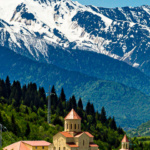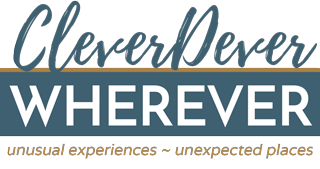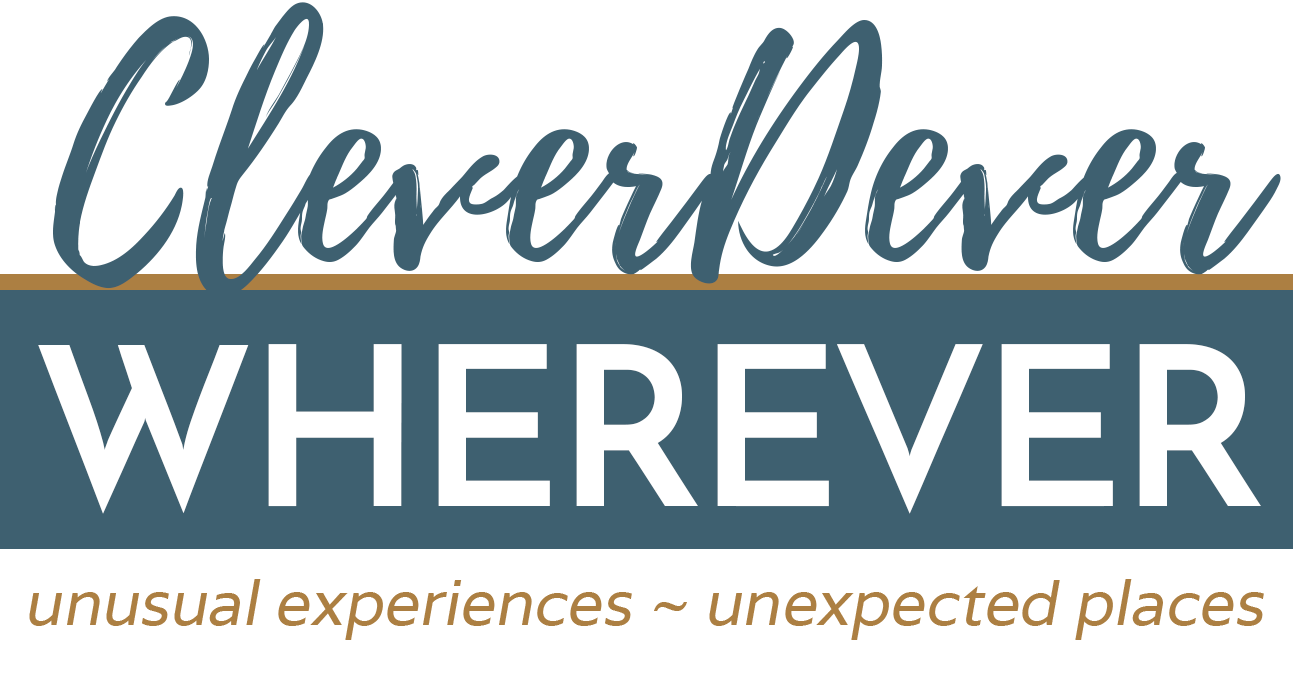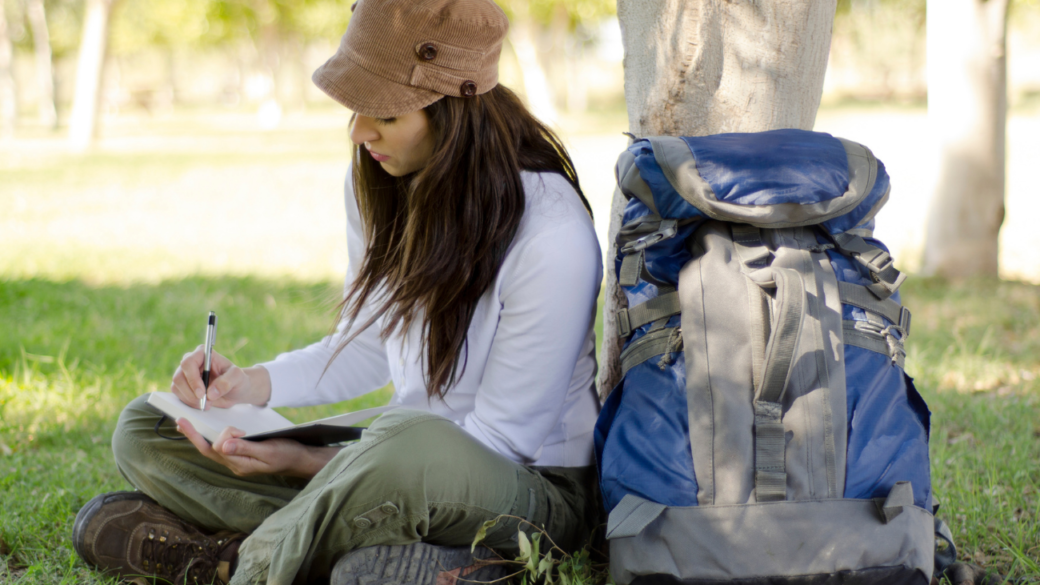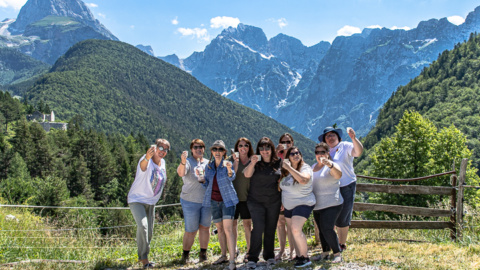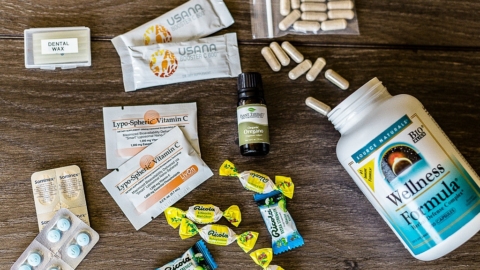Why Travel Journaling Will Make Your Next Trip Better [FB Live SHOW NOTES]
How can you make your next trip more enjoyable? One of the best ways is by travel journaling. Do you journal when you travel? Let’s talk about why it’s so wonderful and how you can make it work for you.
On this week’s show, I’m talking with Lavinia Spalding, an award-winning author and editor who has published ten books about travel. We’re going to specifically discuss her funny and life-changing book Writing Away – a creative guide to awakening the journal-writing traveler.
Who am I? I’m Juliana Dever, an experiential travel expert.
I’ve been traveling the world for 25 years, I’ve visited over 60 countries, lived in 4, and spend about 4 months abroad every year traveling deeper into my favorite countries so I can bring you all the insider information and help you take off-the-beaten-path adventures!
I also work with women in Eastern Europe to create and curate small group Cultural Immersion Trips to their countries which directly support local female and family-owned businesses. Come with me this summer – we’re going to Poland, Georgia and Slovenia.
Here to Discuss Travel Journaling: Meet Lavinia Spalding!
Lavinia is the six-time series editor of The Best Women’s Travel Writing, and the 2022 Frommer’s Easy Guide to New Orleans (coming out this month).
She’s also the co-host of the storytelling podcast There She Goes. Her writing has appeared in The New York Times, AFAR magazine, Sunset, The San Francisco Chronicle, The Guardian, and more. Lavinia teaches writing workshops around the world and is also a TEDx speaker.
“The key, I think, is to become vulnerable to a place. If you open yourself up, you can build intimacy. Out of such intimacy may come a sense of belonging, a sense of not being isolated in the universe.” -Author Barry Lopez
So let’s talk about how to open oneself up to a place through travel journaling.
Why do you think Travel Journaling is important? Let’s talk about benefits in real-time and long-term.
Lavinia: There are so many benefits to keeping a travel journal…journaling in general, you know, journaling at home and away.
There are so many: mental health benefits, there are links to health benefits. Journaling reduces stress. It boosts the immune system.
I think that probably the thing I love most is that when we travel, we are kind of tilted off of our axis. You know, we’re tilted a bit and everything is unsettling. It’s supposed to be, right?
That’s why we travel. We don’t travel to feel comfortable and at home. So travel carries with it this opportunity to shake things up in our life: shake up our emotional self, our fears, or our landscape.
If you travel with a journal, you have a place to really explore that in a really deep way. And to do it in an unfiltered way, to just get super honest with yourself, to become very vulnerable to a place, write down questions and, and explore the answers or the questions themselves.
It’s a place to keep notes that you wouldn’t want to share with anyone else, maybe really embarrassing moments, things like that. But I think, there’s so much opportunity for what I would probably call breakthroughs of consciousness. And if those go unexamined, it’s just a big missed opportunity.
What do you look for in a travel journal?
Lavinia: Personally, I choose an unlined book. I love Moleskins. And the reason why I choose unlined is because I feel like it gives me a lot more freedom. One of the things that I do with my journals is – I’m not an artist, I can’t draw at all – but I love to get creative and use things that sort of make my journals more creative and pretty.
I’ve had artists sketch things in my journals for me. I’ve had kids draw pictures. You know, if I’m ever seated next to a kid, I’ll just whip out my journal and give the kid a pen and the page. And I love those pages of my journals.
I’m perpetually lost. So I try not to rely on GPS too much when I travel because I feel like it’s a barrier to meeting people and I like to meet people. A completely natural way for me to always meet people is to get directions. Whenever anyone is giving me directions, I just whip up my journal and say, could you write me a map?
And then I’ve got it in my journal. I love it. I have the funniest maps. I have one from Fez and it’s in the Medina. It says “turn left at the vegetables, turn right at the meat.” And I’m like, I never would’ve remembered that if it hadn’t had been in my journal.
Do you have an opinion about using an app for travel journaling?
Lavinia: I will say I know nothing about the world of travel journaling apps, because obviously, I’m a very pen and paper journaling person. However, I think that if you are not someone who keeps a journal and an app is the gateway to keeping a journal, then I think you should go for it.
Juliana: It’s a different part of your brain that gets stimulated when you handwrite as opposed to being on your phone. And then you get distracted and then a notification comes up…
I think I prefer the idea of writing and yet when it comes down to it, I use an app on my phone called Day One.
Maybe because I’m just on the road so much, and I spend a lot of time on my tours with my guests. I don’t wanna miss things, but I don’t wanna grab a journal.
Lavinia: I think that you bring up a really great point and it’s a point I make all the time, which is that you don’t want this big journal to get in the way of your trip itself or your experience.
And so it isn’t always practical to be carrying your journal with you throughout the day. It doesn’t make sense. And so I probably would propose a hybrid of either using your app or for people who are really into the pen and paper, just getting a little pocket-size notebook.
Then also it can be sort of like a list of things to dive more deeply into later. So you get home. And if you have a practice of sitting down at the end of your day and writing, then you can just flip open that book and think “oh yeah, I wanna explore what this guy said to me today that I quickly jotted down” and then it can serve as sort of a launchpad for what you want to really write.
Juliana: In Chapter 4, what I really like is the idea of how you give tips to awaken your senses.
How do you recommend people open up to a place through their senses and record it while travel journaling?
Lavinia: It’s a thing that we don’t even think about a lot, those other four senses unless you’re really on a food journey. It’s so easy to forget about those senses when we’re writing. Even writers have to remind themselves to write down what they smelled, what they heard, what they tasted, and what they felt.
Otherwise, we just have this intense overreliance on our sight. One of my favorite travel writers is Ryan Knighton and he’s blind. I love his travel writing because it’s so sensorial.
I always encourage people, whether they’re my writing students or just someone going out into the world, journaling for themselves, to force themselves to explore those other senses.
Add your senses to your travel journaling by:
Lavinia: One thing that I always say is go to a busy place, a park or a market, or the local square and sit and close your eyes and block out sight for a time period, a minute, two minutes, whatever. And then write down everything that you smelled and tasted and touched.
I was in Korea a couple of years ago, on assignment for a magazine. And I was in this temple and I wrote all this stuff, but I forgot to write how the place sounded. And later when I was writing my article, I was so mad at myself. Like why? I don’t know what it sounded like.
The thing is we rely so much on our cameras and we’re such an image-based society now, but travel is more than just what we see. It’s so much more.
Juliana: At the end of each chapter there’s a section that’s called “Inspiration” and Lavinia’s outlined several different ideas. So not only are there exercises throughout the chapters but there are more exercises at the end. This book is full of ways to really experience your travel on such a deeper level.
If you want even more ideas on what to write about, there are 135 writing prompts at the end of the book.
On page 117 you talk about the idea of participating versus sightseeing.
Juliana: “There’s a good reason why traveling and sightseeing have become synonymous in the minds of many. In general, how we travel largely concerns what we look at. It’s the rare tourist who endeavors to become part of the native culture to befriend locals, study the language or contribute to the wellbeing of a community.
These meaningful experiences, memorable encounters, and colorful characters, generally don’t populate tourist zones and backpacker hotspots. They are in off-the-grid towns, the ones your guidebook overlooks. You’ll find them by taking risks and getting involved. The boldest travel adventure we can give ourselves is to go native.”
Juliana: THIS is why I created my tours. This is everything. This is it. It means so much to me. So I want to dig into this some more. If you go on one of my tours with me, I got you. This is exactly how we travel.
For those traveling on their own, what ways can they go off the beaten path to dig into the culture and to connect with people as they travel?
Lavinia: It’s all too easy to skim the surface when we’re traveling. And so sometimes you have to be very purposeful and intentional to get beneath the surface.
You have to say okay, I’m gonna dig. I’m going to, for example, learn this thing while I’m there, I’m gonna take a dance class or a cooking class or a language class. Or I’m going to send myself on a quest.
Send yourself on a quest and write about it in your travel journal
Lavinia: You know, I did this thing once in Mexico where I just sent myself on a quest to find something and it was some silly thing.
I don’t remember what it was, say a travel alarm clock. Maybe I had to visit like 15 stores with my ridiculous quest. I met so many cool sweet people who would take me around. “Maybe my cousin has one over there in his shop, come with me.”
And I felt like I was under the surface. Just having some sort of personal mission for yourself can really help with getting below the surface.
That’s just one idea. There are so many other ways. Really make an effort to talk to people and not to talk about yourself, but to talk about them. And find out from locals about their lives.
When I go into a shop I say, oh, is this your shop? I always try to buy from locals. Then we’ll start talking and I’ll say has it always been this busy on this street? Or how did you first come here? And I end up making this really personal connection. And even if I don’t maintain that connection through the years, whatever I’ve bought, carries that story with it.
When do you suggest someone should write when they travel? We don’t want to spend so much time journaling that we’re not present to the experiences around us.
Juliana: But our memories get fuzzy on details quickly, and your viewpoint on an experience changes in retrospect.
Lavinia: That’s such a good question and it’s a really important part of it. And this is where I would say that a hybrid approach of digital and handwriting travel journaling really works.
In the moment, as you’re processing something, jot down really, really quick impressions. Like, “this street smells like lemons,” that’s all you need to help you remember.
Get the things that your camera didn’t capture. Keep the little travel journal or your app or your voice recordings for the quick impressions that you really want to make sure that you remember and write about later in your big journal.
Do whatever doesn’t feel like homework, because if it starts to feel burdensome, it starts to feel like homework, you’re gonna abandon it.
I am a really big advocate of not doing the “I have to write everything I did every day” approach.
You’ll just get behind and then you’ll feel guilty. And then when something wonderful happens, you won’t feel like you can write about it because you still haven’t written about the thing that happened three days ago.
Don’t worry about that. Just write what you wanna write.
Juliana: Yes. Or just jot down a snippet every day. You know the concept that consistency is better than intensity, which is something we have a hard time grappling with. We like to say “I’m gonna write every day!”
Instead, just say, “I’m gonna write one sentence a day” or whatever because it reinforces that you are someone who writes. It doesn’t have to be all or nothing.
I love how you talk about taking notes in your travel journal as soon as possible after seeing or experiencing something for the first time.
Juliana: We have to tap into that crazy culture shock because if we wait to write, the novelty of a place wears off and we lose the electric raw writing of the newbie perspective.
Lavinia: For sure. And I think that doesn’t mean that when you’ve had this amazing experience that you have to, you know, sit down right at that moment and fill three pages in your journal. It just means like, jot down, you know, five words or a sentence, and then later you can sit down and you can tap back into it.
Getting back to your writing one sentence a day – That’s advice I give so often because first of all, it’s totally doable. You can write one sentence a day, anybody can write one sentence a day. It also tricks you into opening the travel journal.
And once you’ve written that one sentence, you’re going to want to write more probably. So if you say “I’m just gonna write five words a day” or even one word, the hardest part is opening the journal. And once you write that one word, you’re gonna think, oh, I have to write six. Okay, I’ll just keep writing because it’s fun.
I mean, for me, there is nothing I love so much as sitting down with my travel journal in a place that I’ve never been to before and looking around and listening to the birds and sipping my coffee.
Lavinia: It’s such a pleasure and it’s just really such a rare opportunity to connect with our inner selves. I don’t think we give ourselves that gift often enough.
Juliana: Yeah. And that’s another case for grabbing your phone and just saying, “oh my god, they put fried grasshoppers on top of the guacamole. Like, I don’t think I can eat it. It was crunchy.”
You know, like you can just say it really quick when you’re feeling it. Because even when you take a video, the ones that are the most fun are when you catch someone with that “I can’t believe this just happened!” look.
I love capturing that initial delight. Like when I tried the chocolate balls filled with cream and berries on my Slovenia tour.
Juliana: For context: There’s a tiny village I take my guests to that most people don’t know about. At this restaurant, they have a dessert that you don’t expect. There is a hard shell ball of chocolate. Then they pour hot chocolate sauce over the top of the chocolate ball and it suddenly melts and it deflates and it opens up and there are strawberries and cream inside.
Talk about all of your senses!
Lavinia: Right, right. And you have the video of the chocolate ball, you have the picture of the chocolate ball, but what you want to write about is how it tasted and how you felt. The sensory things.
Juliana: Exactly. Because your memory tricks you. It’s such a surprise how, in hindsight, your memory is a different animal than moments after it happens. It’s another case for putting a few details about what it sounded like or smelled like or tasted like when you’re travel journaling.
Lavinia: And for me as a travel writer, it’s a necessity. I have to keep, you know, extensive travel notes because otherwise I just won’t remember.
Another profound quote is on page 186 “travel is an unknown space, thus, whenever I enter it, I’m granted a rare opportunity to reexamine my own perception of reality.”
Juliana: This is a chapter where you talk about being truthful and not writing what you think you should write like, oh, “everyone was so nice.”
Talk a little bit about why it’s so important to write the truth of your perceptions in those moments.
Lavinia: I think that it gets back to what I was saying in the beginning about breakthroughs and how travel can really unsettle us. And if we’re not exploring that…Investigating that can lead to breakthroughs and sort of those aha moments, those epiphanies that we maybe wouldn’t get if we stayed home.
And so if we’re not honest with ourselves during those moments, then like, what’s the point?
What’s the point of travel if you’re just there to – what lie to yourself?
It’s such a great chance to explore your inner self in a moment like that. Some of my favorite travel journal entries are about really embarrassing things that I would not tell anyone, but I went over them in my journal and I digested them and I learned from them and I became a better traveler.
And I think, travel has this capacity to really teach us big life lessons. And if those lessons go unexamined, then we come back home and we’re just the same person that we were when we left.
I think travel journaling is just the ultimate way to really actually improve ourselves.
For Americans, to get anywhere that’s a truly different culture, it takes so much time. It takes so much money.
Juliana: I think – also stemming from the idea of writing truthfully – that, especially for Americans, to get anywhere that’s a truly different culture, it takes so much time. It takes so much money.
In all fairness, when people say, “oh, Americans. Only 37% have passports.” Well, yeah. Do you know how far away every really foreign country is and how expensive that it is? And how little vacation time we have? I mean, I could go on, but the point is that we finally do it, and we recognize what a privilege it is…
And so to get somewhere and then be like, “I’m tired today. I’m angry. I’m sad. I miss my dog.” It’s okay. It’s okay to write about that.
You won’t feel guilty that you’ve spent time or money to go somewhere and you’re having a weird day because the act of journaling about it is actually gonna help you process it. I think – I mean, I’m sure – you’re nodding your head, so I’m sure you agree, but you know, I think it’s important for us to be okay with saying “I’m burnt out today.”
Write for yourself first: travel journaling is the way to process before you create content
Lavinia: One hundred percent, one hundred percent. And if you are, you know, any kind of content creator, if you’re a writer or a blogger or, even creating Instagram stories, if you write for yourself first and you get really honest with yourself, then when you transfer that to an audience your writing is just gonna be so much more personal and aware, self-aware.
And so I think that even writing stuff in your journal that you would never, ever, ever share with anyone is really valuable. Even if it’s just like, I’m bored and I wanna go somewhere new or, you know, like you said-
Juliana: About complaining, right? You’re might feel bad and think “how many people even get to do this?” Or you don’t want to complain, but sometimes it’s okay to be like this “food sucks.”
Don’t be afraid to write in your travel journal and then destroy it
Lavinia: I have writing students write something and then burn it. It’s such a good feeling because we’re afraid sometimes to be that honest in writing, but just the act of writing can be really cathartic.
You don’t have to keep it. You can write a page about something that you would never tell anyone, and then you can destroy that piece of paper. And I think there’s even benefit in that.
Juliana: I agree. I agree. Oh my god, this has been so good. We have to wrap up. If you want to dig into travel journaling, I definitely recommend getting Lavinia’s book “Writing Away.”
Here’s a high-level recap of what we talked about today:
- Why keeping a travel journal is important.
- What to look for in a journal
- Digital journaling versus analog and the hybrid of both
- How to awaken your senses to get the most out of your trip and your writing
- How travel and journaling can connect you more deeply to the people, the places and the experiences around you.
- When to write
- Why writing the truth is so important.
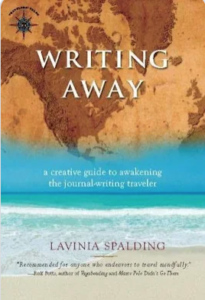
- Ask someone you meet to write something,
- 135 specific writing prompts,
- Inspirations at the end of every chapter, and even
- Suggestions for how and what to physically save to paste into your journal to make it yours.
If you want to buy Lavinia’s book, please support your independent bookstores. Those are mom and pop shops, people who love books and had to dream to sell them to the world. So please buy your books from an independent source.
Buy it here!
How can people find you online and in the real world if they want to attend your writing workshops?
-My website, which is www.Laviniaspalding.com. There’s information about my writing workshops there as well.
-My podcast, which is called There She Goes, I co-host it with Kelly Chappy.
-My Instagram and my Podcast Instagram
What’s Next?
I’ll be back next time to discuss Trip Planning: Discovery and Edit Phase. How do you plan your travel? How do you get a handle on a destination and figure out where to go? What’s on your must list?? What do you take off? I’ll show you how to do this and how to use this one free tool to plot your course.
Want to start exploring new places and connect with other people and cultures?
Book your 2022 adventure with me OR book a call with me and I’ll answer any and all of your travel questions!
Get all the details below…
Next year I have FOUR amazing trips – all insider, authentic experiences with amazing people. You can go to Poland, Slovenia or the country of Georgia with me. You can find all the details below.
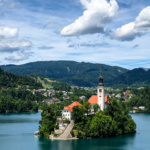
7-Day Alps to Adriatic July 3 – 9th, 2022
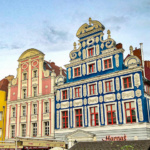
11-Day Windswept Coast to Cobblestones
August 29th – September 8th, 2022
